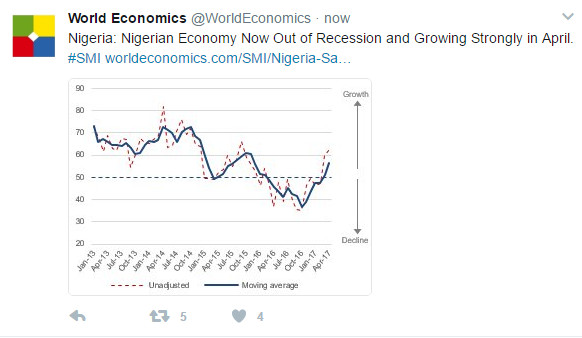News
Nigeria’s Economy out of Recession – World Economics
 The Nigerian economy which recorded negative growth and crept into a recession in the last months has gotten out of doldrums and bounced back from recession.
The Nigerian economy which recorded negative growth and crept into a recession in the last months has gotten out of doldrums and bounced back from recession.
The declaration was announced by a London-based organisation, World Economics, which said that the recession had saw the death of businesses and caused hardship.
World Economics focused on producing financial analysis on world economy, Nigeria’s “Market Growth Index grew to 58.5 in April as the monthly Sales Growth Index ticked up to 56.7, its highest value since 2015 and representative of rapid growth”.
It said although Price inflation for April, remained high at 58.7 – indicative of high levels of inflation, it added however that “a slowing trend has developed for the past 9 months”.
“The challenges and the recent changes to the Naira’s FX rate are aiding sales transactions. Overall, conditions in Nigeria have improved further over the past month and managers are expressing renewed optimism that the economy will continue to grow and regain strength after the recession”, it added.
The International Monetary Fund (IMF) has forecast 2.6 per cent growth for sub-Saharan Africa in 2017.
IMF projected Nigeria’s economy to grow by 0.8 per cent this year, despite current economic realities.
“Output in Nigeria is projected to grow by 0.8 percent in 2017 as a result of a recovery in oil production,” so said IMF chief economist, Maurice Obstfeld who unveiled the fund’s World Economic Outlook in Washington yesterday.
“In sub-Saharan Africa, a modest recovery is foreseen in 2017. Growth is projected to rise to 2.6 percent in 2017 and 3.5 percent in 2018, largely driven by specific factors in the largest economies, which faced challenging macroeconomic conditions in 2016.
After contracting by 1.5 percent in 2016 because of disruptions in the oil sector coupled with foreign exchange, power, and fuel shortages, output in Nigeria is projected to grow by 0.8 percent in 2017 as a result of a recovery in oil production, continued growth in agriculture, and higher public investment,” Maurice added.


















